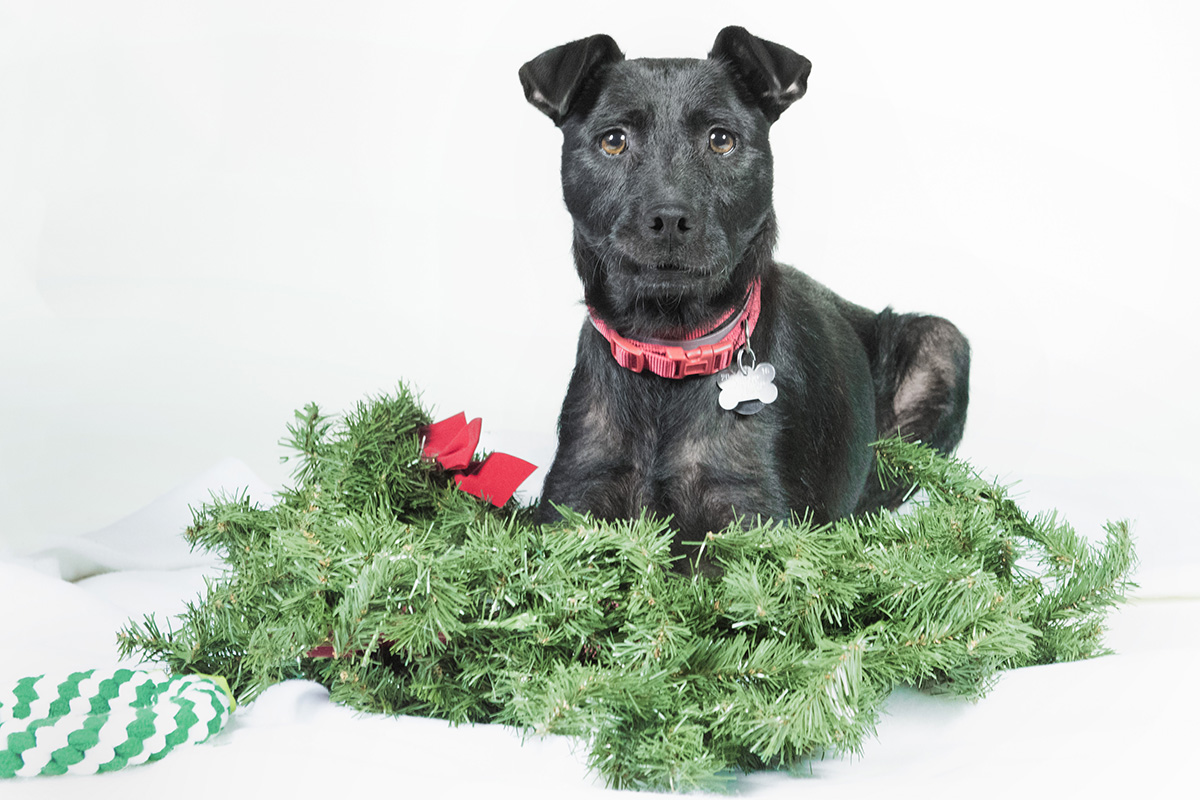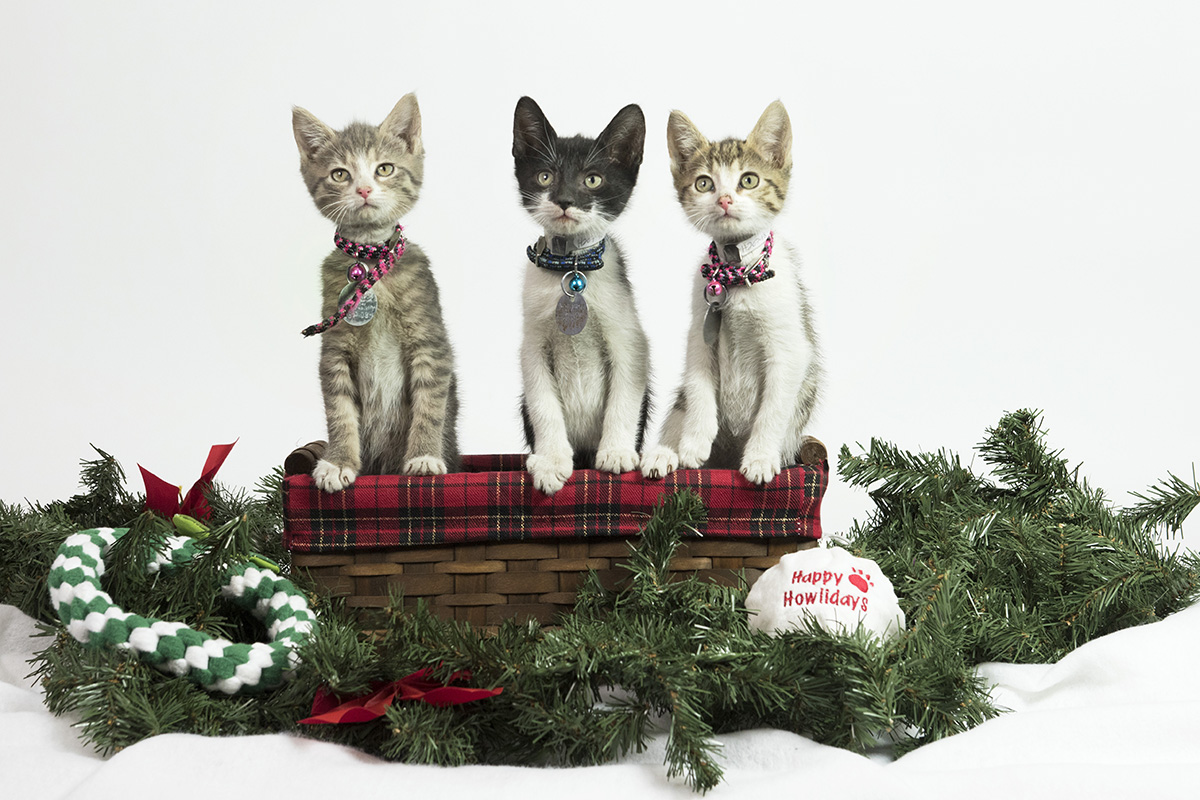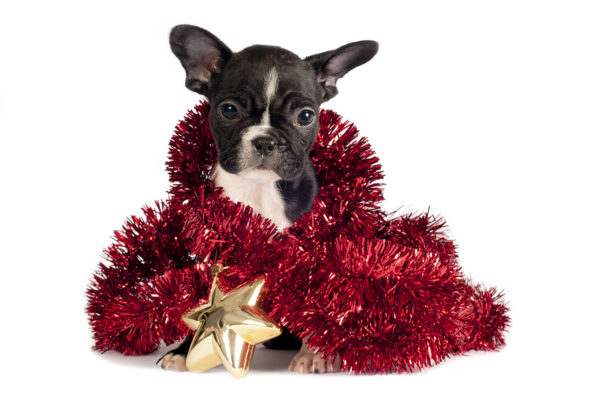Tis the season to be jolly, with bright lights and decorations galore. But don’t forget our four-legged friends when decking those halls. These helpful holiday pet safety tips will make sure everyone enjoys this festive season.
The Christmas Tree
Christmas trees can be problematic for pets. If your tree is not secured properly, a cat or dog can knock it over. Water from your holiday tree can also pose problems. Often, the tree water may contain fertilizers or tree preservatives which can lead to stomach upset. Pine needles are also dangerous if swallowed. Pine needles can be sharp and have the potential to puncture intestines. Ornaments are always a tempting plaything for dogs and cats. Best to make sure they are secure on your tree before they become a choking hazard.
Open Flames
Candles, menorahs and any open-flame objects should be kept far out of your pets’ reach and never left unattended.

Tinsel, Ribbons and Ornaments
Tinsel is a huge temptation for our pets – especially cats. Ingesting tinsel or ribbon can not only lead to stomach upset, but it can get wrapped around our pets’ intestines causing major health problems which may require surgical intervention. Wrapping paper and glass ornaments may also pose threats. If eaten, these foreign substances can cause depression, stomach upset, vomiting, or diarrhea, if not naturally passed. Glass ornaments can cause internal bleeding if shards make internal cuts.
Toxic Holiday Foliage
Holly, mistletoe, evergreens (particularly pine for cats), and Christmas cactus, are common holiday plants that are toxic to your pets. Poinsettia, though not truly poisonous, can cause gastric upset if its sap is ingested. Be aware that lilies and azaleas are often used in holiday floral arrangements and can be toxic. Lilies are particularly dangerous for cats and if ingested can cause intestinal issues and even kidney failure.

Electrical Cords and Batteries
Electrical cords are another potential holiday hazard. Pets sometimes find it appetizing to chew on them which can give them a harmful jolt, burns, abnormal heartbeat, and in worse-case scenarios, death. All cords should be secured and out of the way.
Also, batteries that are used for so many everyday items (remotes, keys, watches, hearing aids) and toys pose as serious danger. If pets ingest batteries, particularly if they chew or puncture them, the caustic substance inside can burn your their mouths, esophagi, or stomachs. Also, if swallowed whole or a large enough portion, a battery can cause an obstruction or blockage of the intestine.
The small round button-sized batteries can also get lodged in the esophagus and cause burns even if they are not punctured. You can offer a little water or milk, but don’t wait to get your pet to a veterinarian as the full extent of injuries may not happen for a full 24 hours.
Snow Globes
Beware of broken snow globes. Inside some of them contain ethylene glycol, a highly toxic substance to all pets. Its sweet smell can attract a pet to lick it up and this can lead to a potentially fatal intoxication. Keep snow globes out of reach of pets.
Sweets and Treats
As always, remember that chocolate is toxic for pets and is found in lots of sweet treats, and may also come into your house wrapped as a gift that is put under the tree. Although, nothing is more tempting than slipping your pet some holiday treats from the table, this is not a good idea. People food can upset your pet’s stomach and some can even cause major illness or death. Keep fatty foods like turkey or ham down to a minimum and totally avoid onions, onion powder, grapes, and raisins (these last two are often found in holiday cookies and cakes). Xylitol, also known as Birch Sugar, is another toxic ingredient found in cake, cookies mixes, yogurt, and even peanut butter. Best rule of thumb is to keep people food for people, and if in doubt, don’t share!



